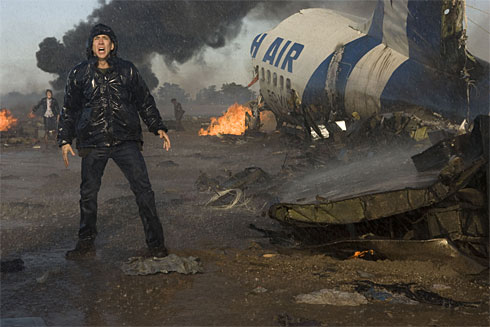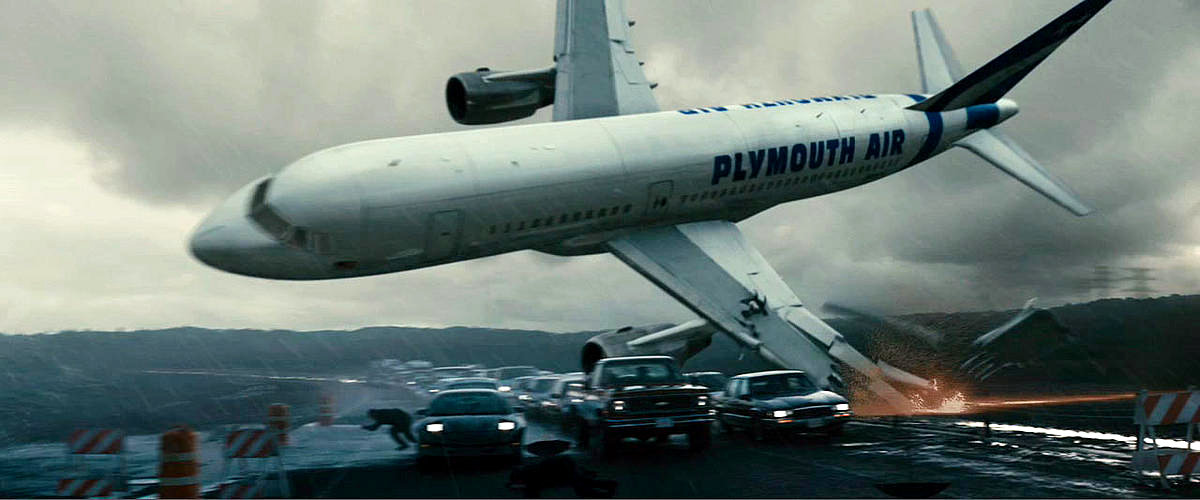 After NEXT, Nicolas Cage fans must be wondering why the star opted to appear in another film about predicting the future. Presumably the actor was working on the theory that “if at first you don’t succeed, try again”; unfortunately, KNOWING shows little awareness of what went wrong before. Despite an intriguing premise and a handful of exciting special effects scenes, this science fiction thriller lumbers along like an overweight leviathan, unable to see much past its own nose – let alone into the future. The story-telling is sloppy and the characters are uninvolving, creating a distance between the audience and the on-screen events, so that when the third act builds toward its climax, the result feels overwrought and unconvincing; instead of excitement, audiences are likely to feel themselves giggling at the desperate attempt to amp up the shallow proceedings. Even forgiving viewers, who might be sympathetic to the message, will be forced to note that said message has been bettere delivered in other films.
After NEXT, Nicolas Cage fans must be wondering why the star opted to appear in another film about predicting the future. Presumably the actor was working on the theory that “if at first you don’t succeed, try again”; unfortunately, KNOWING shows little awareness of what went wrong before. Despite an intriguing premise and a handful of exciting special effects scenes, this science fiction thriller lumbers along like an overweight leviathan, unable to see much past its own nose – let alone into the future. The story-telling is sloppy and the characters are uninvolving, creating a distance between the audience and the on-screen events, so that when the third act builds toward its climax, the result feels overwrought and unconvincing; instead of excitement, audiences are likely to feel themselves giggling at the desperate attempt to amp up the shallow proceedings. Even forgiving viewers, who might be sympathetic to the message, will be forced to note that said message has been bettere delivered in other films.
The story has a grade school opening a time capsule filled with student predictions of the future from 50 years ago. Most consist of crayon drawings, but Caleb (Chandler Canterbury) receives a page consisting of an elaborate sequence of numbers. During a drunken bout of self-pity, Caleb’s widowed father John Koestler (Cage) examines the numbers and finds that they conform to the dates of major disasters. He is able to predict a couple of upcoming events, but whether he can do anything about them is unclear; in any case, it soon becomes clear that the last event on the list refers to the “End of Everything,” so human intervention seems to be a moot point. However, some other kind of intervention is lurking in the shadows, mysterious “men in black,” who seem to be observing Koestler and his son.
Early scenes suggest a pleasantly pseudo-scientific approach to the material. Cage plays an astronomer, and his discussions with a colleague hint that the film may actually grapple with the question of predicting the future, perhaps even offer a plausible theory. Unfortunately, this approach is abandoned as Koestler pursues the disasters, and the film eventually moves into a mystical approach. The enigmatic strangers (who seem to have wandered in from director Alex Proyas’s much better DARK CITY) may be time travellers, aliens, or angles (or all of the above), but in dramatic terms they are basically a deus ex machina that will resolve the plot.
Basically, the film turns into a rewrite of SIGNS. Like Mel Gibson’s character in the far superior M. Night Shymalan film, Koestler is a man who has fallen into despair since the death of his wife, believing that life is nothing but random, meaningless events; as before, the threat of global disaster forces him to reassess his cynicism and decide that there is a pattern or intelligence at work in the universe, guiding events toward some kind of meaningful goal. Sadly, this turn toward a pseudo-religious approach seems like a desperate attempt to write the script out of the corner into which it has written itself; unlike SIGNS, which was convincingly heartfelt even if you did not totally believe it, KNOWING feels insincere, as if merely offering a sop to audiences who want some kind of happy ending. The implications of this ending are ignored as the film opts instead for trite symbolism meant to gloss over the gaping holes in credibility.

The film only really comes to life during two disasters, one involving a plane and the other a train. These sequences are the highlight of the film; the absolutely stunning special effects are far more convincing than the characters and dialogue, and a long, continuous steadicam take of Koestler running amidst the plane wreackage is a tour de force almost worth the price of admission on its own.
Unfortunately, the impact of the trainwreck is marred by some script silliness, which has Koestler heading toward the predicted disaster, instead of avoiding it. The film vaguely suggests he hopes to accomplish something, but his actions are frankly stupid – the kind of thing that would get him arrested by suspicious cops rather than convincing anyone to help avoid disaster. As if that were bad enough, Cage’s character receives a movie star exemption that allows him to survive the wreck without his foreknowledge in any noticeable way contributing to that survival; the result is so arbitrary that the lack of suspense on his behalf is truly amazing.
Cage offers up one of his standard-issue performances, hitting all the obvious marks without lending any kind of distinction to the role, which emerges as a generic father protecting his son. He is not helped by some stupid developments in the script. At least he comes across better than Rose Byrne as Diana Wayland, daughter of the woman who penned the mysterious string of numbers. The third act requires her to turn into such a nervous wreck, running around like a generic hysterical woman driven to panic in a disaster, that you are almost relieved when she meets her predicted fate.
Building a story around a premise that promises the end of the world is a tricky gambit, one that requires careful handing. Audiences may righttly wonder why they should invest emotionally in a story that seems to be heading toward the ultimate downer. The film can either end on a depressing note or cop out with a phony happy ending. KNOWING pulls off the incredible (though hardly worthy) achievement of doing both, but by the time it happens you won’t much care one way or the other.
If you want to see a film on this subject that achieves a truly cathartic heartache, watch MIRACLE MILE (1988) instead. KNOWING seems too self-obsessed with its own psuedo-mysticism to truly affect the audience on a similarly emotional level; its attempts in this direction seem feeble and half-hearted. It really is too bad. Director Alex Proyas scored strongly with his first two feature films, THE CROW (1994) and DARK CITY (1988). Back then, who could have seen into the future and known that he would end up directly soulless star vehicles like I, ROBOT and KNOWING?

KNOWING (2009). Directed by Alex Proyas. Screenpay by Ryne Douglas Pearson and Juliet Snowden & Stiles White and Stuart Hazeldine, adaptation by Alex Proyas, story by Ryne Douglas Pearson. Cast: Nicolas Cage, Chandler Canterbury, Rose Byrne, D. G. maloney, Lara Robinson, Nadia Townsend, Alan Hopgood, Adrienne Pickering, Joshua Long, Danielle Carter, Alethea McGrath, David Lennie.
2 Replies to “Knowing – Science Fiction Film Review”
Leave a Reply to soulartist Cancel reply
You must be logged in to post a comment.
Perceptive, well-thought out, and generous. Great presentation. Thanks.
Thank you! 🙂